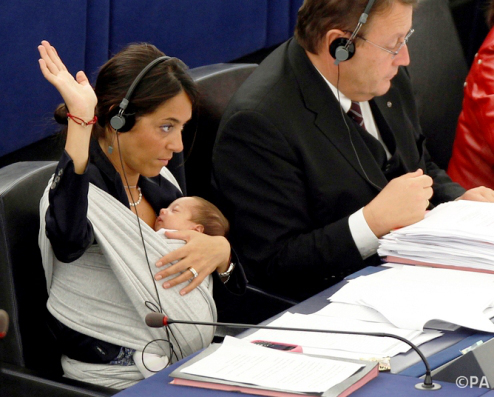I am an IBCLC (International Board Certified Lactation Consultant) in private practice in Northern Ireland and a La Leche League Leader with La Leche League of Ireland
Open Letter To Sammy Wilson MP in response to his comments on Breastfeeding
Dear Sammy,
This morning I heard you interviewed on the Stephen Nolan show about the new independent report on sexism in Westminster. The report (which was welcomed by the Speaker of the House) made many suggestions but one was to create a "role-model parent friendly institution" by allowing breastfeeding in the Westminster chamber. The report stated that making this change would "enable all members to participate fully in House business".
Your response to this suggestion was to disagree and state that it was "voyeurism". When pressed on the use of this word you then said that it was "exhibitionism". Sammy, my job is as an IBCLC (International Board Certified Lactation Consultant). Essentially I help women who want to breastfeed their babies. You cannot imagine how unhelpful your comments have been this morning.
You stated that women could do it elsewhere in Westminster and don't need to do it in the Chamber. Sammy, don't you see how this is no different to saying that a woman can breastfeed at home, she doesn't need to do it in a cafe, or in a church or in a leisure centre or anywhere else that she happens to be? You questioned why a woman would want to breastfeed in the Chamber. Perhaps it was exhbitionism you said. Believe me Sammy, women are not trying to be exhibitionists when they breastfeed in public. Most women are fearful when they begin breastfeeding with others around. What if their baby won't latch? What if he cries and everyone looks? What if someone approaches them negatively? What if they are asked to leave?
These fears cause women to feel isolated. It causes them to stay at home more than they want at a time when they need social support. It prevents them from participating fully in society. For an MP it prevents her from doing her job. The very act of stating that it should't be done in the chamber sends a message that there is something wrong with it. That it is something not to be seen. It influences mothers, pregnant women and young girls in the way that they think about babies and mothering. All a breastfeeding mother is trying to do is feed her baby. She has no other thoughts other than the thoughts of a mother for the welfare and comfort of her child.

Image linked from http://tinyurl.com/jpr22dr Breastfeeding in the European Parliament
Why would she want to feed in the Chamber? I doubt any MP would think, "oh my baby is likely to be hungry soon, sure I'll just head into the Chamber to feed him." The member would simply be doing her job, conducting her business in the house and responding to her baby's needs as they arise. You said that perhaps babies shouldn't be in the Chamber at all. That would on the face of it seem to get around this issue of breastfeeding I'm sure, but in reality what it does is isolate women again. It tells women that they cannot be productive members of society if they are breastfeeding. It prevents women who want to return to work when they have a small baby from doing so.
It's not just as simple as feeding her baby before she enters the chamber either. Babies are tiny, obviously. That means they have tiny stomachs. Small babies need to feed frequently and need to be at the breast most of the time. Debates can be long, and it is not reasonable nor practical, nor biologically workable to expect a mother to schedule her baby.
You talked about the choice to breastfeed Sammy and here is where I think we get to the real nub of the problem. When we talk about choice we imply parity of options, but for mothers and babies the choice of breastfeeding or giving an artificial baby milk are not equal options. There are real implications, both for the health of the mother, the baby and for wider society. Earlier this year the Lancet published a series of reports on breastfeeding (http://www.thelancet.com/series/breastfeeding). In that series they stated that
The deaths of 823 000 children and 20 000 mothers each year could be averted through universal breastfeeding, along with economic savings of US$300 billion". They stated "If breastfeeding did not already exist, someone who invented it today would deserve a dual Nobel Prize in medicine and economics. For while “breast is best” for lifelong health, it is also excellent economics. Breastfeeding is a child's first inoculation against death, disease, and poverty, but also their most enduring investment in physical, cognitive, and social capacity.
They also made very clear that this was not just an issue in developing nations. A UNICEF article provided a high level summary of some of the Lancet series. It said,
in high-income countries breastfeeding reduces the risk of sudden infant deaths by more than a third.... For mothers, longer-duration breastfeeding reduces the risks of breast cancer and ovarian cancer....Modelling conducted for the Series estimates that global economic losses of lower cognition from not breastfeeding reached a staggering US$302 billion in 2012, equivalent to 0.49% of world gross national income. In high-income countries alone these losses amounted to US$231.4 billion, equivalent to 0.53% of gross national income (Paper 2, table 2). Furthermore, the authors calculate that boosting breastfeeding rates for infants below 6 months of age to 90% in the USA, China, and Brazil and to 45% in the UK would cut treatment costs of common childhood illnesses (eg, pneumonia, diarrhoea, and asthma) and save healthcare systems at least US$2.45 billion in the USA, US$29.5 million in the UK, US$223.6 million in China, and US$6.0 million in Brazil.
(http://www.unicef.org.uk/BabyFriendly/News-and-Research/News/The-Lancet-Increasing-breastfeeding-worldwide-could-prevent-over-800000-child-deaths-every-year/)
Those are significant figures, Sammy I'm sure you'll agree, particularly when our NHS is struggling. The Lancet series was very clear that breastfeeding succeeds where it is protected, promoted and supported, and called on Governments to protect, promote and support breastfeeding. The steps outlined in the report around breastfeeding in Westminster would be a wonderful step forward in regard to this.
One other point I want to make, Sammy. You suggested that people of your generation don't want to see breastfeeding. With all due respect, Sammy you appear to be making this about you and your discomfort. This isn't about you. A woman breastfeeding her child is simply feeding her child. Your discomfort with her feeding her baby would seem to be about your own prejudices. Would you also feel uncomfortable with a women bottle feeding her child? Do you have discomfort with a baby feeding, or with the fact that a women is designed to use her body to do it? Our babies deserve better than this from our elected representatives. Our babies are the future. They deserve to have less illness, and a better lifelong health trajectory. They deserve to have a healthier mother with less chance of developing cancers. They deserve to meet their genetic potential. This issue is about the babies and the future of our nation, not about the cultural discomfort of a generation who weren't taught the importance of breastfeeding for the normal physiological growth of their children.
I encourage you to read the Lancet series and reconsider your position and words. To leave you with the words of the series,
success in breastfeeding is not the sole responsibility of a woman — the promotion of breastfeeding is a collective societal responsibility.
If you have any questions about a consultation or would like to arrange to meet, please get in touch.
Important Information
All material on this website is provided for educational purposes only. Online information cannot replace an in-person consultation with a qualified, independent International Board Certified Lactation Consultant (IBCLC) or your health care provider. If you are concerned about your health, or that of your child, consult with your health care provider regarding the advisability of any opinions or recommendations with respect to your individual situation.
